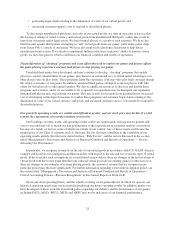Zynga 2012 Annual Report Download - page 28
Download and view the complete annual report
Please find page 28 of the 2012 Zynga annual report below. You can navigate through the pages in the report by either clicking on the pages listed below, or by using the keyword search tool below to find specific information within the annual report.much larger and more well-established markets and may be perceived by our players to offer greater variety,
affordability, interactivity and enjoyment. These other forms of entertainment compete for the discretionary time
and income of our players. If we are unable to sustain sufficient interest in our games in comparison to other
forms of entertainment, including new forms of entertainment, our business model may no longer be viable.
Competition in the social game industry is intense.
The social game industry is highly competitive and we expect more companies to enter the sector and a
wider range of social games to be introduced. Our competitors that develop social games for social networks vary
in size and include companies such as Electronic Arts Inc., DeNA Co. Ltd. (Japan), The Walt Disney Company,
Crowdstar, Inc., Vostu, King.com and Wooga. In addition, online game developers and distributors who are
primarily focused on specific international markets, such as Tencent Holdings Limited in Asia, and high-profile
companies with significant online presences that to date have not developed social games, such as Facebook,
Google Inc. and Microsoft Corporation, may decide to develop social games. Some of these current and potential
competitors have significant resources for developing or acquiring additional games, may be able to incorporate
their own strong brands and assets into their games, have a more diversified set of revenue sources than we do
and may be less severely affected by changes in consumer preferences, regulations or other developments that
may impact the online social game industry. In addition, we have limited experience in developing games for
mobile and other platforms and our ability to succeed on those platforms is uncertain. As we continue to devote
significant resources to developing games for those platforms, we will face significant competition from
established companies, including Electronic Arts Inc., GREE International, Inc., DeNA, Gameloft SA, Glu
Mobile Inc., Disney and Rovio Mobile Ltd. We expect new mobile-game competitors to enter the market and
existing competitors to allocate more resources to develop and market competing games and applications.
The value of our virtual goods is highly dependent on how we manage the economies in our games. If we fail
to manage our game economies properly, our business may suffer.
Paying players purchase virtual goods in our games because of the perceived value of these goods which is
dependent on the relative ease of securing an equivalent good via non-paid means within the game. The
perceived value of these virtual goods can be impacted by an increase in the availability of free or discounted
Facebook Credits and/or Facebook’s local-currency based payments, or by various actions that we take in the
games including offering discounts for virtual goods, giving away virtual goods in promotions or providing
easier non-paid means to secure these goods. If we fail to manage our virtual economies properly, players may be
less likely to purchase virtual goods and our business may suffer.
Some of our players may make sales and/or purchases of virtual goods used in our games through
unauthorized third-party websites, which may impede our revenue growth.
Virtual goods in our games have no monetary value outside of our games. Nonetheless, some of our players
may make sales and/or purchases of our virtual goods, such as Zynga Poker virtual poker chips, through
unauthorized third-party sellers in exchange for real currency. These unauthorized transactions are usually
arranged on third-party websites and the virtual goods offered may have been obtained through unauthorized
means such as exploiting vulnerabilities in our games or from scamming our players with fake offers or virtual
goods or other game benefits. We do not generate any revenue from these transactions, or have any control over
them. Accordingly, these unauthorized purchases and sales from third-party sellers could impede our revenue and
profit growth by, among other things:
• decreasing revenue from authorized transactions;
• creating downward pressure on the prices we charge players for our virtual currency and virtual goods;
• causing us to lose revenue from paying players who stop playing a particular game;
• increasing costs we incur to develop technological measures to curtail unauthorized transactions;
20
























